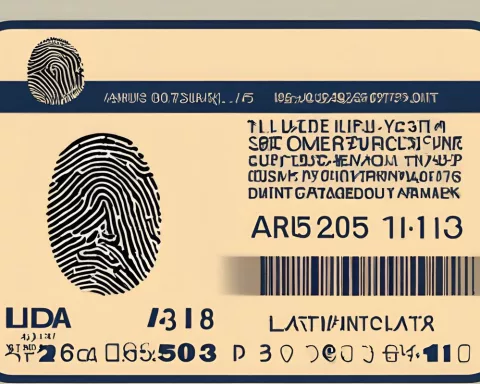South Africa is stepping into a new age with Smart ID cards, replacing the old green ID books. These new cards are safer, making it harder for identity theft to happen, and they will help the government serve people better and faster. While the green books will still be valid for now, the government is working hard to get everyone a Smart ID, especially those in remote areas. This change is important for everyone, as it promises a more secure and modern way to prove who you are in a digital world. Overall, the move to Smart ID cards is a big leap toward a safer and more efficient future for all South Africans.
What are Smart ID cards and why are they important for South Africa?
Smart ID cards in South Africa are advanced identification cards that enhance security and efficiency compared to traditional green ID books. They reduce identity theft risks, streamline service delivery, and align with global standards, ensuring all citizens can access modern identification solutions.
In an era where technology increasingly influences the effectiveness of government services, South Africa stands at the brink of a transformative journey. Home Affairs Minister Leon Schreiber’s recent announcements herald a significant shift towards modernization with the introduction of Smart ID cards. This strategic move promises not only heightened security but also a more efficient identification process for all citizens, setting a new benchmark in public service delivery.
Transitioning from Green ID Books
Minister Schreiber’s announcements via platform X sought to clarify misunderstandings surrounding the future of the green ID books. Contrary to circulating rumors, these documents will remain valid beyond the year-end, dispelling fears of an immediate discontinuation. The Department’s current focus is on ensuring the widespread availability of Smart ID cards before finalizing any plans to phase out the older system. This approach reflects a thoughtful balance, aiming to facilitate a seamless transition for citizens while addressing the logistical challenges involved.
The traditional green ID books have long posed security challenges. Deputy Minister Njabulo Nzuza emphasized the vulnerabilities associated with these documents, highlighting their susceptibility to identity theft and credit fraud. The simplistic design of the green books makes them easy targets for duplication and forgery. These concerns underscore the urgent need for a more secure and contemporary solution to protect citizens’ identities in an increasingly digital world.
In response, the South African government introduced the Smart ID card program in 2013. These new cards represent a technological leap, incorporating advanced security features that significantly reduce the risk of tampering. This move aligns with global trends in identity management, where nations are embracing smart identification systems to combat fraud and enhance governmental efficiency.
Overcoming Implementation Hurdles
While Smart ID cards offer clear advantages, their implementation presents its own set of challenges. A critical aspect of this transition involves reaching every citizen, including those residing in rural or underserved areas with limited access to government services. To tackle this challenge, Minister Schreiber outlined several strategies to enhance service delivery. These include partnerships with banks, the introduction of home delivery services, and the development of new online channels. Such initiatives aim to dismantle accessibility barriers, ensuring that every South African can participate in this modernization effort.
In our increasingly digital world, South Africa’s push for an updated identification system resonates with contemporary movements advocating for inclusivity and diversity. Similar to how art challenges norms and pushes boundaries, the government’s initiatives strive to create an inclusive identity framework. This framework aims to serve all citizens effectively, regardless of their geographical location or socio-economic status, thereby reinforcing a commitment to equity and access.
Officials have been actively encouraging citizens to transition to Smart ID cards before the green books are officially retired. Awareness campaigns have intensified, focusing on the security risks associated with the outdated identification system and highlighting the benefits of the upgrade. The Department’s online booking system plays a crucial role in this transition, offering a streamlined process for citizens to apply for their new IDs without the inconvenience of long queues or administrative hurdles.
Embracing a New Era of Identity Management
The narrative surrounding South Africa’s identity modernization echoes the transformative themes of the Industrial Revolution, a period characterized by rapid technological changes and societal shifts. Just as that era redefined industries and lifestyles, the adoption of Smart IDs marks a reimagining of identity management in the 21st century. It underscores the importance of leveraging technology to enhance public services and protect citizens’ personal information.
While the green ID books hold a nostalgic place in South Africa’s history, the path forward leads to Smart ID cards. This transition is not merely about adopting new technology; it signifies alignment with global standards and a proactive stance against the rising threats of identity theft and fraud. As the Department advances its modernization plans, it calls upon all South Africans to join in this journey towards a more secure and efficient identification system, one that promises to safeguard their identities in an ever-evolving digital landscape.
In conclusion, the shift to Smart ID cards represents a pivotal moment in South Africa’s public service reform. By embracing technological advancements, the country can ensure a more secure, efficient, and inclusive identity management system, ultimately enhancing the quality of life for its citizens and setting a precedent for other nations to follow.
“`markdown
What are Smart ID cards and why are they important for South Africa?
Smart ID cards are advanced identification cards introduced in South Africa to replace the traditional green ID books. They are crucial because they enhance security, reduce identity theft risks, streamline service delivery, and ensure that all citizens have access to modern identification solutions that align with global standards.
How does the transition from green ID books to Smart ID cards work?
Minister Leon Schreiber has stated that green ID books will remain valid for the time being, dispelling rumors of an immediate phase-out. The government is focused on making Smart ID cards widely available before finalizing plans to discontinue the green books, ensuring a smooth transition for all citizens.
What security advantages do Smart ID cards offer?
Smart ID cards incorporate advanced security features that significantly reduce the risks of tampering, duplication, and forgery—issues prevalent with the green ID books. This move helps protect citizens from identity theft and fraud in an increasingly digital world.
How is the government addressing accessibility concerns for Smart ID cards?
To ensure that all citizens, including those in rural or underserved areas, can access Smart ID cards, the government is implementing several strategies. These include partnerships with banks, home delivery services, and the development of new online channels to enhance service delivery and dismantle accessibility barriers.
What initiatives are in place to raise awareness about the transition to Smart ID cards?
The South African government has intensified awareness campaigns to inform citizens about the security risks associated with the outdated green ID books and the benefits of transitioning to Smart ID cards. The Department’s online booking system also facilitates a streamlined application process, reducing long queues and administrative hurdles.
Why is this transition significant beyond just technological advancement?
The shift to Smart ID cards is more than just adopting new technology; it represents a commitment to inclusivity, equity, and the fight against identity theft in a digital age. By modernizing the identification system, South Africa aims to enhance public services, protect citizens’ information, and set a precedent for other nations in identity management.
“`












